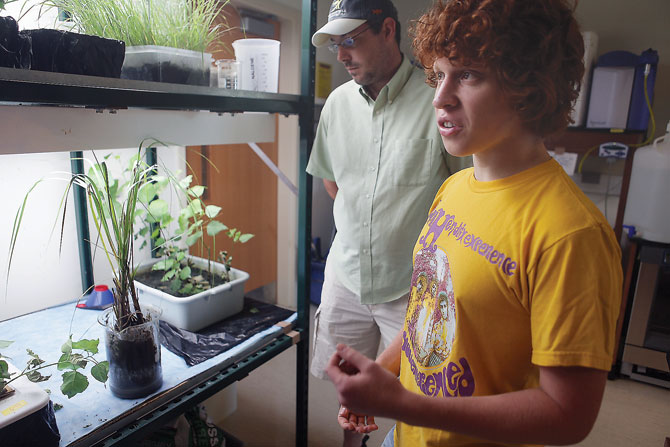These two University of Iowa engineering students traveled to the Gulf Coast this summer, in the wake of the BP oil spill disaster, to lend their help and expertise to the difficult recovery process.
Part of a research team that includes UI professor Jerry Schnoor, they collected native grass samples for a research project that will help figure out the best approach to restoring the Gulf marshlands, should they die from their toxic conditions. The project will determine just how much oil local plants can survive in, how they purge it from their systems, and how fast the wetlands might be expected to recover.
 Newsmakers: Elliott Beenk And Aaron Gwinnup
Newsmakers: Elliott Beenk And Aaron Gwinnup
What's the big deal?
The marshes are critical to the Louisiana ecosystem and region because they act as a buffer for hurricanes, provide a unique habitat for wildlife, and support the economically important shrimping industry.
Although they live some 1,000 miles from the Gulf Coast, these Iowans felt compelled to respond. Says Beenk, "I felt detached and helpless and got tired of hearing the news talk only about the problem. I wanted to be on the side working towards solutions."
What was the trip like?
When they arrived in the Gulf, Beenk and Gwinnup could feel tension emanating from a community on the edge. They were intrigued to see Grand Isle residents expressing their emotions on beachfront signs—"We Love BP" and "Boycott BP"—in both support and condemnation of the oil industry.
At a time when successive scandals have battered public trust in the corporate world, Tippie Dean William "Curt" Hunter and his colleagues believe the UI program owes more to its students—and society—than just practical training in disciplines such as accounting or finance. Hunter contends that the college has a civic obligation to cultivate a strong and unshakable sense of ethics and values in its future business leaders. From the "Integrity" element of the school's "Power of I" brand (also including "Innovation" and "Impact," the principles on which Tippie builds its programs) to an intensive MBA ethics course that challenges students to solve complex moral crises, the college stresses the importance of critical thinking with a conscience.
What happens next?
Although they weren't allowed access to "hot zones" that had been inundated by the spill, the students did collect uncontaminated plant samples to analyze for trace amounts of oil. They are also growing their own lab samples, which they will contaminate with oil to observe how the plants react.
Research results won't be known for six to 12 months, but, in the meantime, the students stress the environmental lessons to be learned from the disaster. "The oil spill is a tragedy, but good can still come from this unfortunate event," Beenk says. "Moving forward, the most important step is for us to realize why we were drilling for oil in 5,000 feet of water in the first place. I believe the spill should be used to bring light to this issue and motivate people to look at how we can reduce our addiction to oil."

